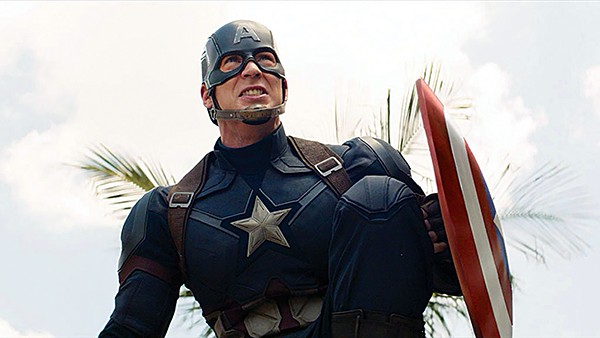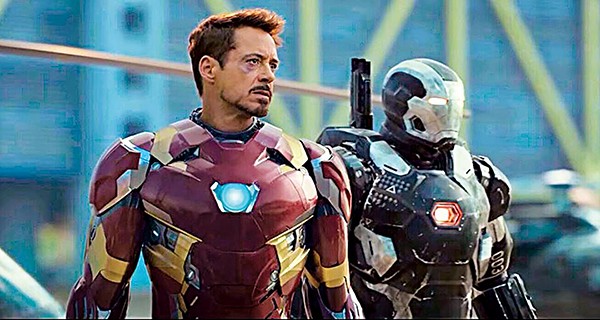Another May, another superhero movie. How far along are we on this wave of superhero movies? I date it from Bryan Singer’s X-Men in 2000, although you could argue that it goes back to Tim Burton’s 1989 Batman. The studios have refined the hit-making formula, crowding all other genres out of the blockbuster space. Only Star Wars brings in that kind of business, and, as great as The Force Awakens was, it clearly showed the marks of the Disney/Marvel method. As long as the returns remain good, the culture will be papered with comic book movies — and with Captain America: Civil War opening to $673 million on a $250 million budget, there’s no sign the returns are going to fall off any time soon.
Constraints breed creativity, and as formulaic as big-time superhero movies have become, Kevin Feige has a good process in place that both delivers the corporate goods and encourages filmmakers to do good work. Two of the Jon Favreau/Robert Downey Jr. Iron Man movies have been exceptional, but the real heart of the Marvel Cinematic Universe’s overarching narrative is the Captain America franchise since Chris Evans was introduced as Steve Rogers in 2011’s Captain America: The First Avenger. Directed with a classical flair by Joe Johnston, The First Avenger established Captain America as a link to the country’s most heroic period: fighting the Nazis to save freedom. Steve Rogers has become a stand-in for America’s best version of ourselves. Whether it’s a super weapon in the hands of the Red Skull in his first film or an unaccountable surveillance state in Winter Soldier, how he reacts to the problems thrown at him is in accordance with the best angels of our civic religion.
Much of the credit for the success of the Captain America movies must be laid at the feet of Evans, who plays Steve Rogers as empathetic and fundamentally decent but with a strong sense of melancholy befitting a man out of time. The series has also been bolstered by strong direction, first from Johnston and then from Joe and Anthony Russo, who plunged the stalwart super patriot into a world of spy vs. spy intrigue in The Winter Soldier. The best superhero stories come when the heroes are confronted with challenges they are not well-equipped to face and a villain with enough vision to turn the heroes’ strengths into weaknesses. Captain America, the super soldier created to fight the Nazis, the ultimate external threat, found new depth when he had to tease out friend from foe inside the government he has sacrificed everything to serve.

There are two sides to every story — Chris Evans (above) as Captain America; Robert Downey Jr. and Don Cheadle as Iron Man and War Machine.

The Russos are back at the helm for Civil War and have once again tried to tie into the zeitgeist of a divided America. 2016 gives us two blockbusters about superheroes fighting each other. The first was Zac Snyder’s dismal Batman v Superman: Dawn of Justice. Civil War is much better in every respect, largely living up to Winter Soldier.
To defeat Superman, you must put Lois Lane in danger. He’s too powerful to beat on his own, so you have to trick him into making mistakes. Similarly, the way you defeat Captain America is to put Bucky Barns (Sebastian Stan), aka the Winter Soldier, in danger. Bucky is Steve Rogers’ only link to the life he left behind in the 1940s, and Rogers feels partially responsible for Bucky getting the Soviet super soldier treatment that transformed him into a brainwashed assassin. When Civil War opens, Bucky’s been lying low since his escape at the end of The Winter Soldier. Captain America and his revamped crew of Avengers — Scarlet Witch (Elizabeth Olsen), Vision (Paul Bettany), and Black Widow (Scarlett Johansson) — are engaged in their usual business of keeping the world safe by chasing the fabulously named superterrorist Brock Rumlow (Frank Grillo). But, as usual when an “enhanced persons” donnybrook breaks out in an urban area, there are collateral casualties. In this case, a delegation of development workers from the reclusive African kingdom of Wakanda, the source of the world’s vibrainium, the material that Captain America’s shield is made from. The king of Wakanda, T’Chaka (John Kani) leads a movement to bring the Avengers under the formal control of the United Nations, and other countries, seeing the devastation wrought in the Avengers’ former battlegrounds, quickly come on board.
After Tony Stark is confronted by the mother of a young man killed during the final battle of Avengers: Age of Ultron, he decides to back the UN resolution, known as the Sokovia Accords after the city that Ultron levitated into oblivion. But Steve Rogers disagrees. The Avengers were created to keep the world safe from superpowered bad guys, and Rogers is absolutely sure that he is the only person qualified to determine when and how those threats can be identified and neutralized. He and Stark are already on the outs when a truck bomb blows up the United Nations meeting on the Accords, and his old friend Bucky is tagged as the guy to blame. Rogers is torn between loyalties to his friend, to his government, and his own moral sense, and his path splits the Avengers into factions: the Iron Man-led, pro-accord forces, which include Black Widow, Vision, War Machine (Don Cheadle), and T’Challa, (Chadwick Boseman), aka Black Panther, the son of the slain Wakandan monarch who has vowed to kill Bucky. Standing with Captain America are Falcon (Anthony Mackie), Scarlet Witch, Ant Man (Paul Rudd), and Hawkeye (Jeremy Renner). To tip the odds in his favor, Stark tracks down Peter Parker (Tom Holland), who has only been Spider-Man for six months, and recruits him with an offer of a new spider suit.
The introduction of Spider-Man, the Marvel comic book empire’s greatest character creation, is just one demonstration of how superior the Marvel touch is to the DC regime. The Russos know we’ve seen Spider-Man’s origin story onscreen twice in this century, so when Stark asks Parker how he got his powers, he just mumbles “It’s complicated,” and leaves it at that. Holland’s version of Parker is closer to Toby Maguire’s goofy persona than the Andrew Garfield iteration, which is a big improvement.
Boseman’s Black Panther is a welcome addition to the MCU. He gives T’Challa a regal bearing that suggests he would fit in on Game of Thrones. The end of Civil War charts an interesting future for him, which we’ll get to see more of in his solo movie scheduled for 2018.
The centerpiece of Civil War is a great set piece inside the evacuated Leipzig airport where the two factions go at it for what feels like a good 15 minutes. Here the Russo’s major inspiration for the film comes into focus. The Empire Strikes Back brought moral complication into the Manichaean Star Wars universe, and Civil War attempts to do the same by making Rogers choose between competing goods at every turn. While defending Winter Soldier from Iron Man, Captain America says he’s doing it because Bucky is his friend. “I was your friend, too,” the wounded Stark says.
The shifting allegiances give the Russos a chance to bounce different pairs of characters off of each other, and it’s obvious this is where their interests really lie. Especially good together are Downey and Renner, who capture the raw anger of a longtime friendship betrayed.
Civil War is massively overstuffed with characters and fragmentary storylines intended to connect to the bigger universe but which bogs down the present story. Captain America: Civil War is a fun time at the movies, and among the best of its breed, but you can be excused if you feel superhero fatigue setting in.